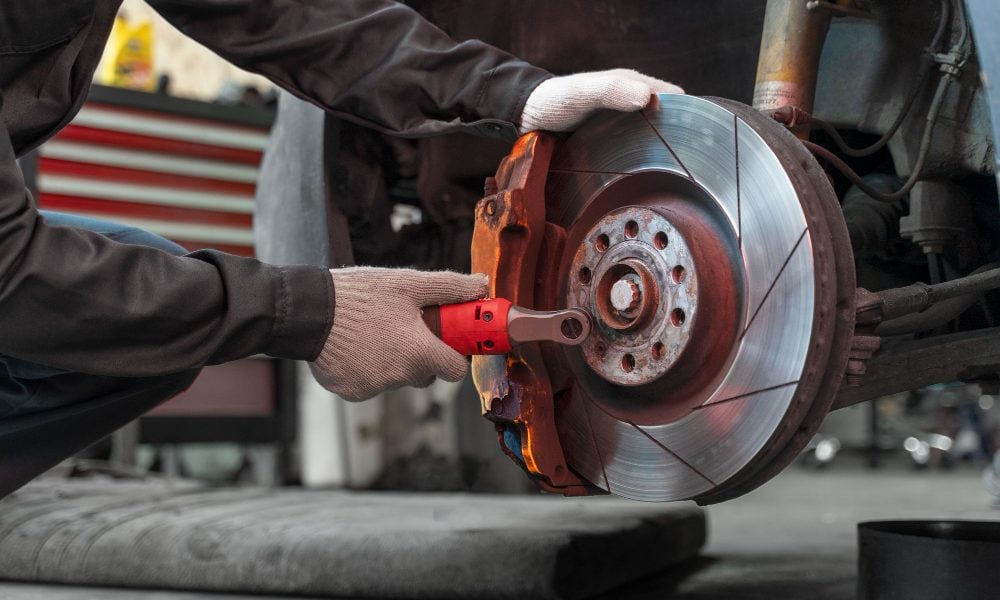
How Often to Change Brake Pads and Rotors to Keep Your Car Safe

A brake system is crucial when it comes to maintaining your vehicle’s safety. Every driver should be familiar with the question, “How often to change brake pads?” Brake pads and rotors are vital to your car’s ability to stop efficiently, ensuring you can react quickly in unexpected situations. Ignoring the condition of these parts can lead to decreased stopping power, longer braking distances, and an increased risk of accidents.
Understanding Brake Pads and Rotors
Before diving into how often these components should be replaced, it’s essential to understand what brake pads and rotors do. Brake pads are small yet critical components that press against the rotors (the large metal discs inside your wheels) to create the friction necessary to slow down your car. Over time, this friction wears down both the brake pads and the rotors, necessitating their replacement.
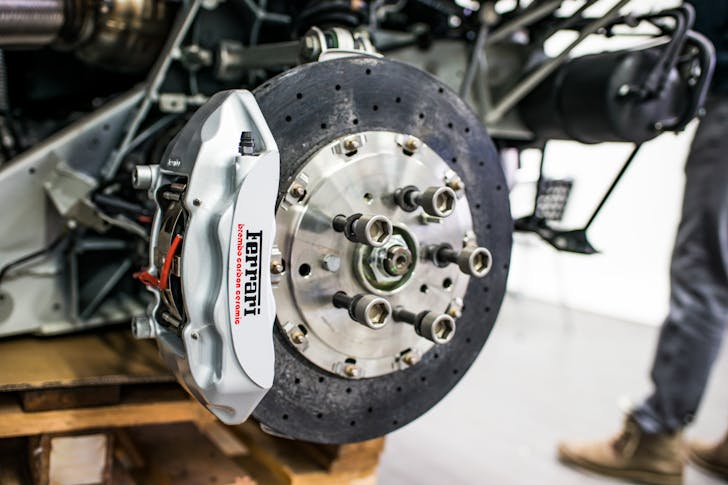
Lex Ger | Pexels | Brake pads are small yet critical components that press against the rotors to create the friction necessary to slow down your car.
Rotors are designed to withstand significant wear and tear, but they are not invincible. As you drive, the constant pressure and heat generated during braking cause them to thin and develop grooves. Brake pads, made from a combination of materials like metal shavings, rubber, and resin, wear out even faster due to the intense friction they endure with each stop.
How Often to Change Brake Pads
Brake pads generally need replacement every 10,000 to 20,000 miles, depending on your driving habits and the type of vehicle you own. If you frequently drive in heavy traffic or on winding roads, you may find that your brake pads wear out closer to the 10,000-mile mark. Conversely, highway driving with minimal braking can extend the life of your brake pads.
It’s not just the mileage that dictates when you should change your brake pads. Listen to your car. High-pitched screeching or squealing noises when braking often indicate that your brake pads are worn out and need replacing. A small metal shim typically causes this sound, called an indicator, that’s built into the brake pad. When the pad wears down, the indicator makes contact with the rotor, creating that distinctive noise as a warning sign.
Another sign to watch for is a vibrating or pulsating brake pedal, which can suggest that your brake pads are unevenly worn or that your rotors are warped. In either case, it’s time to get your brakes checked out.
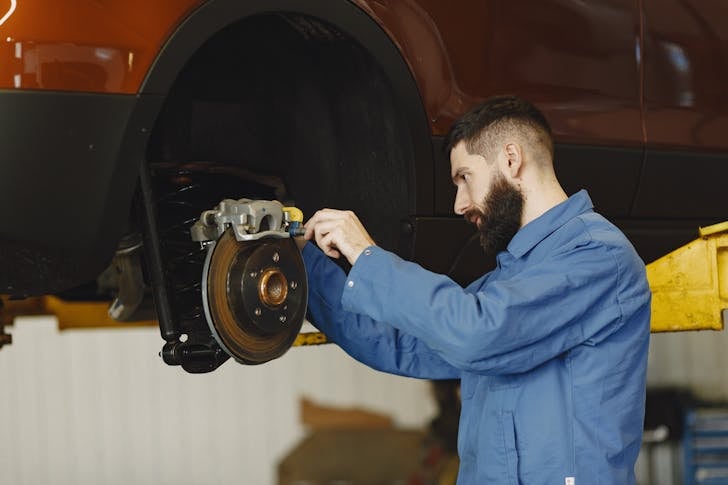
Gustavo Fring | Pexels | Brake pads need replacement every 10,000 to 20,000 miles, depending on your driving habits and the type of vehicle you own.
How Often to Change Rotors
While brake pads wear out more quickly, rotors generally have a longer lifespan. Most rotors should be replaced every 50,000 to 70,000 miles. However, if you frequently drive in conditions that are hard on your brakes—like towing heavy loads, driving in mountainous areas, or making lots of stop-and-go trips—you may need to replace your rotors sooner.
Worn-out rotors can cause various issues, including increased stopping distances, a spongy brake pedal, and even brake failure in extreme cases. If you feel vibrations in the steering wheel when you apply the brakes, it could indicate that your rotors are warped and need to be replaced.
Signs Your Brake Pads and Rotors Need Replacement
Even if you’re diligent about tracking your mileage, your brake system might still need attention sooner than expected. Here are some signs that it’s time to replace your brake pads and rotors:
- Intermittent Screeching: This high-pitched noise when braking indicates that your brake pads are worn and need replacement.
- Vibrating Steering Wheel: If your steering wheel vibrates when you apply the brakes, it could mean your rotors are uneven, or your brake pads are wearing unevenly.
- Grinding Noises: If you hear a grinding sound when you brake, it’s a sign that your brake pads have worn down completely, and the metal of the caliper is now making contact with the rotor. This situation is dangerous and should be addressed immediately.
Why Regular Replacement is Essential
Regularly replacing your brake pads and rotors is crucial not just for your safety but also for the overall health of your vehicle. Worn brake pads can damage your rotors, leading to more expensive repairs. Furthermore, driving with worn brake pads and rotors reduces your car’s braking efficiency, increasing the distance needed to stop and raising the risk of accidents.
Maintaining your brake system can improve your driving experience and safety. New brake pads and rotors provide smoother and quieter braking, making your daily drives more comfortable and reducing wear on other components of your vehicle’s braking system.
More inAdvice
-
`
Why 1 in 4 Americans Trust RFK Jr. for Medical Advice
A recent poll reveals that a significant portion of Americans remain cautious about trusting Health Secretary Robert F. Kennedy Jr.’s medical...
September 19, 2025 -
`
Why Tariffs Could Make Car Insurance Rates Worse
Car insurance costs in the U.S. are climbing, and new tariffs could make the problem worse. Shoppers are already feeling the...
September 11, 2025 -
`
The Automotive Reckoning Has Arrived – Are Companies Ready?
In early 2022, Stellantis CEO Carlos Tavares stood on stage in Amsterdam with a confident blueprint for the future. Fresh off...
September 5, 2025 -
`
Self-Driving Cars Will “Drastically” Change Automotive Design, GM Says
The automotive industry is entering a new chapter that goes far beyond electrification. While EVs dominate today’s headlines, the rise of...
August 29, 2025 -
`
Child Wearing Swimsuit Outside Sparks CPS Visit — The Full Story!
Children playing outside is a familiar and often joyful sight. Yet, sometimes, an innocent choice—like a child wearing a swimsuit outdoors—can...
August 22, 2025 -
`
Florida Auto Insurance Rates Finally Drop. But for How Long?
After years of rising premiums, Florida drivers are finally seeing lower auto insurance rates on the horizon. For 2025, the state’s...
August 15, 2025 -
`
U.S. Reduces Tariffs on Japanese Cars to 15% Under Trump’s Deal
In a move reshaping U.S.-Japan trade relations, former President Donald Trump confirmed a new agreement that slashes tariffs on Japanese car...
August 9, 2025 -
`
Adults in Ohio Face Stricter Rules to Obtain Driver’s License
Ohio has passed a new law that will change the way adults under 21 get their driver’s licenses. Signed into law...
July 31, 2025 -
`
Gen Z Craves Career Guidance, But Their Parents Are Struggling Too
Gen Z is stepping into the future with curiosity and ambition—but they’re not doing it alone. A growing number of teens...
July 25, 2025


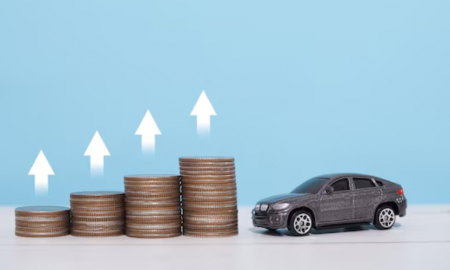







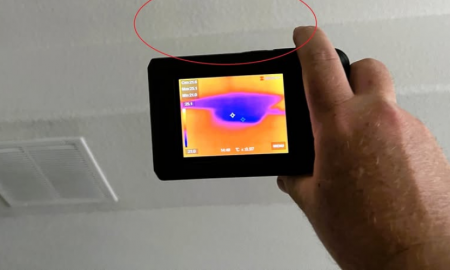
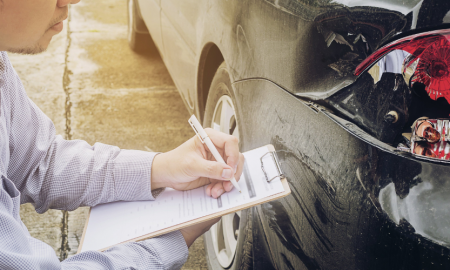



You must be logged in to post a comment Login